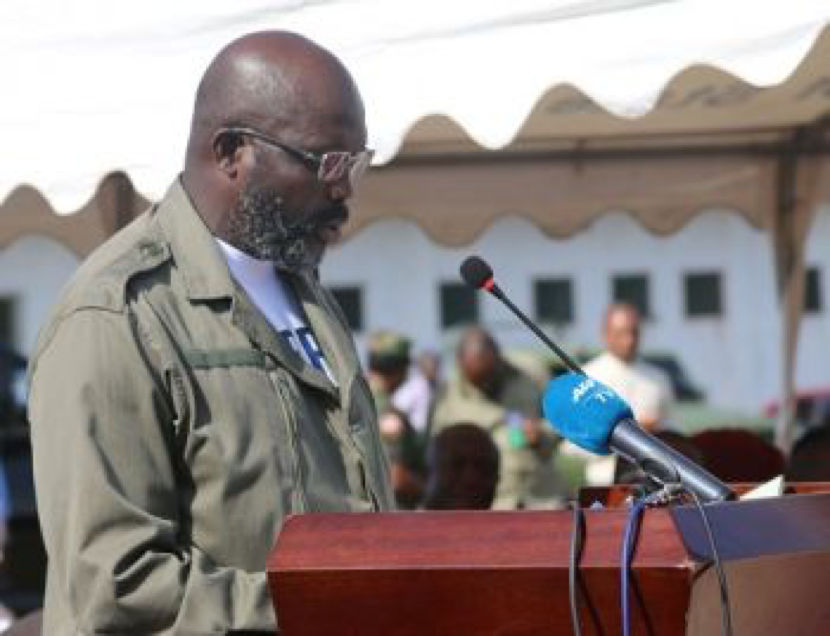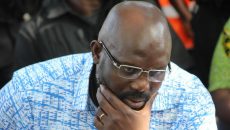MONROVIA, Montserrado – On Monday, President George Weah broke grounds for the construction of the first military hospital in the country in a colorful ceremony at the Edward Binyah Kesselly Military Barracks.
The commander-in-chief of the armed forces had promised to build a military hospital during the celebration ceremony of Armed Forces Day on February 11.
Addressing journalists at a press conference, Finance Minister Samuel Tweah said the engineering battalion of the army would carry out the construction of the hospital. This, he said, would save the government at least 40 percent of the total cost of the project.
Prior to the groundbreaking ceremony, officers of the army’s Engineering Battalion cleared 11.5 acres of land at the EBK Military Barracks for the construction of the hospital.
In the recast budget recently passed by the legislature, the government allocated US$200,000 for the feasibility study for the construction of the military hospital.
The local affiliate of Transparency International, the Center for Transparency and Accountability in Liberia, has criticized the amount allocated for the project’s feasibility study.
CENTAL’s program manager, Gerald Yeakula, said the US$200,000 was an unreasonable allocation.
“Except there is an issue of wording in the line, but feasibility as it is, I think that US$200,000 is much, especially given that we are using army personnel to do the work,†Yeakula said.
According to him, feasibility studies as understood for construction does not require much other from investigating the possibility of constructing the proposed facility on the land identified.
However, Benjamin Momolu, the chief engineer for FREBENJA Group of Companies, a local construction firm, explained to The Bush Chicken that feasibility studies for construction projects often conduct technical studies on whether the site would be feasible for the earmarked infrastructure.
While the government said the army would help with the construction, it has not said who will or has conducted the feasibility study. But Momolu said the feasibility study stage is often costly.
“It is from the feasibility study you will know what kind of design the project should carry to suit the soil and site location, and all the information gathered will guide the design and construction stages, including financial options,†he said.
He declined to say whether he thought the US$200,000 allocation was appropriate.
“That is not for me to say, because I don’t know the details of the project, but feasibility costs a lot of money depending on who is hired,†he said.
The holding of the groundbreaking for the project suggests that the feasibility study has already been conducted. The president disclosed at the groundbreaking ceremony that in less than two months since the commitment to build the hospital was made, the government has obtained the plans for the proposed medical facility and arranged the required finances.
Information on the costs of constructing the facility would usually only come as a result of the feasibility study.
Weah did not disclose how much was needed to fund the construction or the source of the funds for the construction.
The president said in the next few weeks, construction on the proposed hospital would commence.
“The new hospital to be named and styled as the 14th Military Hospital will be equipped with the most modern facilities and will be staffed by having trained medical personnel,†he said.
The president named the hospital after the number on the jersey he wore while playing for the country’s national soccer team. Weah said the number would serve as a reminder of what Liberians can achieve when they put their minds together.
“We can be the best in the world,†he said. “You will soon learn that I am a man of action and deeds, not of empty words and talk.â€
He said the hospital would provide training opportunities for soldiers of the armed forces in all medical discipline. According to him, the facility is the first step toward his commitment to build a modern and professional army.
As the hospital marks the first project undertaken by his administration, Weah said it would also serve as the beginning of another promise and it would not be the last.
At the ceremony, Defense Minister Daniel Ziankahn said the hospital’s construction could not be any timelier, especially when soldiers of the armed forces and their families were in dire need of quality health care.
Giving a brief overview of the project, the army’s chief medical officer, Dr. Joshua George, said the proposed hospital is a 250-bedroom facility that would not only cater to the soldiers, their families, nearby communities and the larger society, but also provide training and conduct medical research.
Besides concerns about the cost of the feasibility study of the hospital, some critics say a military hospital impacts too few people for it to be a priority of the government, given that Liberia has around 2,000 members of the Armed Forces of Liberia.
Martha Vai, a 40-year-old woman in Paynesville, called on the government to prioritize other initiatives that would benefit ordinary citizens.
Vai said although the proposed medical hospital would provide medical services to the army, it would not affect a major of poor citizens.
She said there were already several medical facilities in the country that faced problems, including limited supply of drugs and other medical essentials, limited number of quality medical staff, and low incentives for available medical staff.
“Me, I want hear that the government has created more jobs, or it has reduced the cost of basic commodities,†she said.
Featured photo courtesy of Executive Mansion



